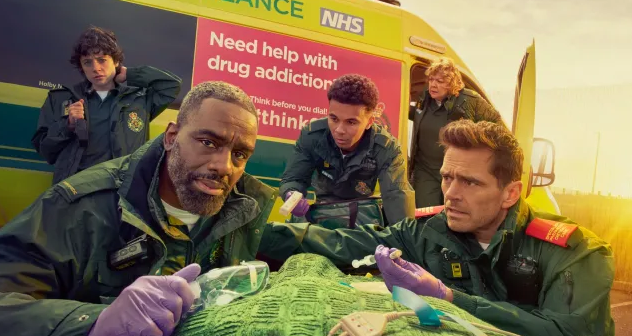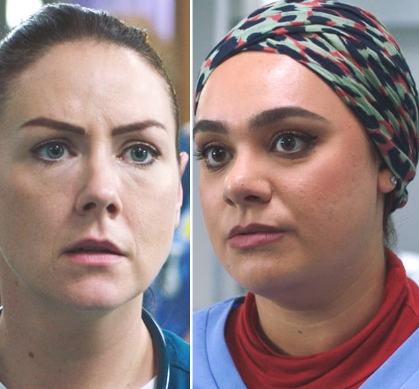The long-running medical drama Casualty is currently undergoing one of its most significant periods of transformation, facing a series of profound changes that promise to redefine its future. From shifts in key personnel and beloved character departures to a revised production schedule, the show is grappling with challenges and opportunities that will undoubtedly impact its narrative direction and the experience of its dedicated fanbase. These developments underscore a dynamic period for the series as it navigates both creative evolution and broader industry pressures.
A pivotal change arriving in the Emergency Department (ED) is the introduction of Siobhan McKenzie, set to assume the crucial role of Clinical Nurse Manager. Portrayed by Main Hill, whose past work includes the well-received character of Maggie Budon in Waterloo Road, Siobhan is poised to bring a fresh dynamic to the team. Hill’s previous roles have often showcased her ability to embody compassionate yet strong figures, and it is anticipated that Siobhan will similarly project an authoritative presence tempered with genuine empathy. Her leadership is expected to be firm but fair, crucial for navigating the high-pressure environment of the ED. This appointment marks a new chapter for the nursing staff and promises to inject fresh perspectives into the daily operations and character interactions within the hospital.
Siobhan’s arrival is intrinsically linked to the departure of Donna Jackson, played by Jaye Jacobs, after a relatively brief but impactful return to the series. Fans were surprised by Donna’s sudden exit, particularly given her recent dramatic storyline involving a prison sentence for dangerous driving. Donna’s character has a rich history within the Casualty universe, having previously been a staple of the show and its sister series, Holby City. Her previous tenure established her as a tenacious and often morally complex nurse whose personal life frequently intertwined with her professional responsibilities. Her recent storyline, culminating in a devastating accident and subsequent conviction, provided a poignant and realistic exploration of accountability and consequences, making her sudden departure all the more impactful. While her absence leaves a void, it simultaneously clears the stage for Siobhan McKenzie to establish her own legacy and contribute to the ongoing evolution of the ED’s leadership. Donna’s connection to the wider Holby City universe reinforced the show’s interconnectedness, and her exit closes a significant chapter in that shared narrative.

Beyond new arrivals, Casualty is also bidding farewell to several major figures, marking the end of significant eras for the programme. The most profoundly emotional departure is that of Derek Thompson, who is stepping down from his iconic role as Charlie Fairhead after an astonishing 37 years. Charlie is not merely a character; he is the longest-serving continuous character in a prime-time medical drama globally and has been the unwavering heart and soul of Casualty since its inception in 1986. For generations of viewers, Charlie has been a comforting, constant presence – the kind, often exasperated, but always dedicated Charge Nurse who has witnessed countless medical emergencies, personal traumas, and the ever-changing landscape of the NHS. His character has navigated storylines ranging from personal crises like his wife Megan’s death and his son Louis’s struggles, to major hospital disasters and the everyday heroism of the ED staff. His departure represents an unparalleled shift, as the show must now navigate a future without its moral compass and foundational presence. The absence of Charlie’s steadying hand and compassionate wisdom will undoubtedly be profoundly felt, requiring the remaining cast and crew to redefine the core dynamics of the series.
Another significant character exit is that of Max Christie, portrayed by Nigel Harman. Despite joining the show only a year prior, Max quickly made a substantial impact, endearing himself to fans with his charming yet complex persona. As the clinical lead, Max brought a fresh energy and a touch of charismatic leadership to the ED, often balancing sharp medical acumen with a more rebellious personal streak. His storylines provided new avenues for character development and conflict, and his rapid rise in popularity made his announced departure a devastating blow for viewers who had invested in his character’s journey. While the reasons for his relatively swift exit may be varied, it highlights the show’s ongoing commitment to dramatic narrative twists, even if it means saying goodbye to promising characters sooner than expected. Max’s short but memorable tenure demonstrated the show’s ability to introduce compelling new talent and integrate them effectively into its established world.
In a crucial behind-the-scenes development, John S, the executive producer widely credited with revitalizing Casualty in recent years, is stepping down at the end of the year. John’s tenure, particularly during Series 37, has been lauded for its creative innovation and commitment to impactful storytelling. Under his guidance, the show delivered some of its most memorable and critically acclaimed episodes. This included the groundbreaking paramedic improvisation special, a bold experimental episode that showcased the raw, unscripted intensity of emergency response, earning widespread praise for its realism and technical ambition. Additionally, John oversaw a poignant and powerful documentary episode celebrating the 75th anniversary of the NHS, offering a unique blend of drama and real-world insight into the institution that Casualty has championed for decades. His creative vision brought renewed energy and artistic merit to the series, ensuring it remained relevant and engaging in a competitive television landscape.

The departure of an executive producer always carries a degree of uncertainty for a long-running series. While it presents an opportunity for fresh perspectives and new creative directions, it also raises concerns among fans about continuity and whether the show will maintain the momentum and quality established by its predecessor. The challenge for the incoming executive producer will be to balance honoring the show’s rich legacy with introducing their own vision, ensuring that Casualty continues to resonate with its audience while exploring new narrative territories. The change signifies a crucial juncture for the show’s creative future.
Compounding these personnel shifts is a more sobering update regarding Casualty’s production schedule. The BBC has confirmed that the show will undergo a hiatus and, for the foreseeable future, operate with a reduced episode count, dropping from the usual 43-48 episodes per series to just 36. This decision is largely attributed to the ongoing cost-of-living crisis, a macroeconomic pressure impacting production budgets across the television industry. While a reduced episode count might initially trigger concerns about the show’s long-term viability, the BBC’s strategy appears to be a deliberate pivot towards “quality over quantity.” By producing fewer episodes, the aim is to concentrate resources, ensuring that each installment maintains a higher production value and narrative impact, rather than stretching budgets across more content.
Despite these significant changes, optimism for Casualty’s future remains strong. The show continues to boast a dedicated fanbase and consistently achieves robust viewership figures, cementing its position as a flagship drama for the BBC. Its enduring popularity is further evidenced by recent award nominations and wins, which highlight its continued critical acclaim and cultural relevance. As a deeply embedded part of British television history, and given its strong performance, it is highly improbable that the BBC would consider cancelling such a successful and culturally significant series. While the reduced episode count may necessitate adjustments in storytelling pace and character arcs, it is viewed by many as a temporary, strategic measure designed to ensure the show’s long-term health and ability to continue captivating audiences with high-quality, compelling narratives.

In conclusion, Casualty stands at a transformative crossroads, simultaneously embracing new blood, bidding emotional farewells, and adapting to contemporary production challenges. These changes, while significant, are testament to the show’s enduring capacity for evolution and its commitment to staying relevant. With a focus on impactful storytelling, the series is poised to navigate this new era, continuing its legacy of dramatic intensity, emotional depth, and its unwavering portrayal of the frontline heroes of the NHS. The pulse of Holby ED beats strong, ready for its next compelling chapter.





